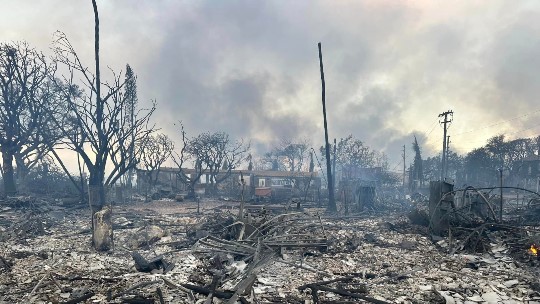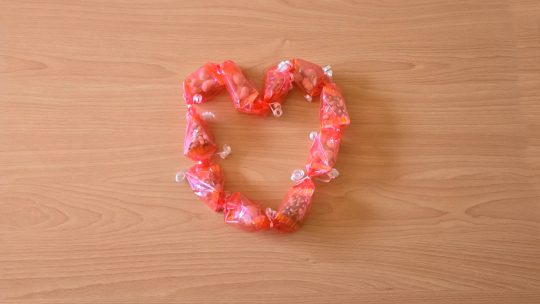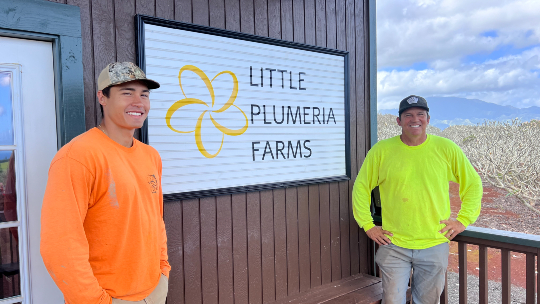Poor air quality from a devastating emergency, such as the wildfires on Maui and the Big Island, can be harmful to the lungs, irritate the eyes and skin, and be absorbed into the blood and heart from the lungs. Knowing what steps to take and which warning signs to pay attention to are especially important for those with lung diseases, like asthma and chronic obstructive pulmonary disease, as they risk worsening their conditions.
We talked to Brian Wu, M.D., a pediatric pulmonologist and HMSA medical director, to find out what to do if we’re affected by poor air quality.
A dangerous combination
Wildfire smoke is a mix of gases including carbon dioxide and carbon monoxide, fine particles from burning trees, plants, and buildings, and other materials. This smoke can affect anyone and make them sick. “Wildfires severely worsen air quality, not only in the affected areas, but also downwind,” Dr. Wu says. “It’s really bad if you can see and smell the smoke, but it can also be bad when it’s not so obvious, so pay attention to public health official recommendations.”
Wildfire smoke inhalation can be dangerous for anyone with lung diseases, like asthma and chronic obstructive pulmonary disease, because it can worsen their condition. “If you’re on any medications, stay on them,” Dr. Wu says. “And if you can’t access your medications, please reach out to your provider.”

The air quality in Lahaina after the wildfires. Photo courtesy Rae Enzo.
Beyond the lungs
Unfortunately, toxins from the wildfires carried in the air not only affect the lungs, but can also irritate the eyes and skin and be absorbed from the lungs into the blood and heart. Some studies done during the California wildfires found higher rates of heart attacks. “Seek care,” says Dr. Wu, “if you have chest pain, frequent coughing, wheezing, shortness of breath, feel dizzy or light-headed, nauseated for no clear reason, or feel like your heart is rapidly beating or pounding in your chest or beating irregularly.”
Dr. Wu encourages everyone to be especially vigilant when it comes to those who may have barriers to letting someone know the air is bothering them. “This includes young children, those who live alone, and those with dementia,” he says.
Tips for dealing with poor air quality
Even as time passes, exposure to lingering smoke and ash can still cause significant health problems. Here are some tips from Dr. Wu to take care of yourself and your loved ones.
- Follow evacuation recommendations from emergency officials immediately.
- If possible, move to an area that has cleaner air, especially if you have high-risk medical conditions.
- If you’re in an area that’s not being evacuated, stay indoors with doors and windows closed. If available, use HEPA filters in your air filter and/or air conditioner.
- If you’re driving in areas affected by smoke, keep your windows up and turn on your air conditioner with the recirculate option.
- Although exercise is good for you, unless you’re living in an area where air quality wasn’t affected by the fires, take a pause on outdoor exercise. That’s because when you exercise, you breathe harder ... and you don’t want to take big deep breaths of bad air.
- Well-fitted N95 masks may help, but they’re not meant to fully protect you from smoke inhalation. Stay away from smoke-filled areas.
- If you participate in clean-up activities, be sure to wear an N95, KF94, KN95, or P100 mask and eye protection.
Additional resources
Here are some resources about air quality and staying safe during wildfires.
AANHPI Ohana Center of Excellence Wildfire Recovery and Resilience Resource Guide
American Red Cross – Wildfire Safety
CDC – Chronic Conditions and Wildfire Smoke
CDC – Protect Yourself from Wildfire Smoke
Hawaii Ambient Air Quality Data
Smoke & Dust Advisory for Maui & Hawaii Island
Learn more
Check out our video with Dr. Wu discussing how to deal with poor air quality. The video also features Kim Hera, manager of the HMSA Center in Maui, sharing her experience living and working on Maui during the wildfires.
Hero and thumbnail photos courtesy Rae Enzo




